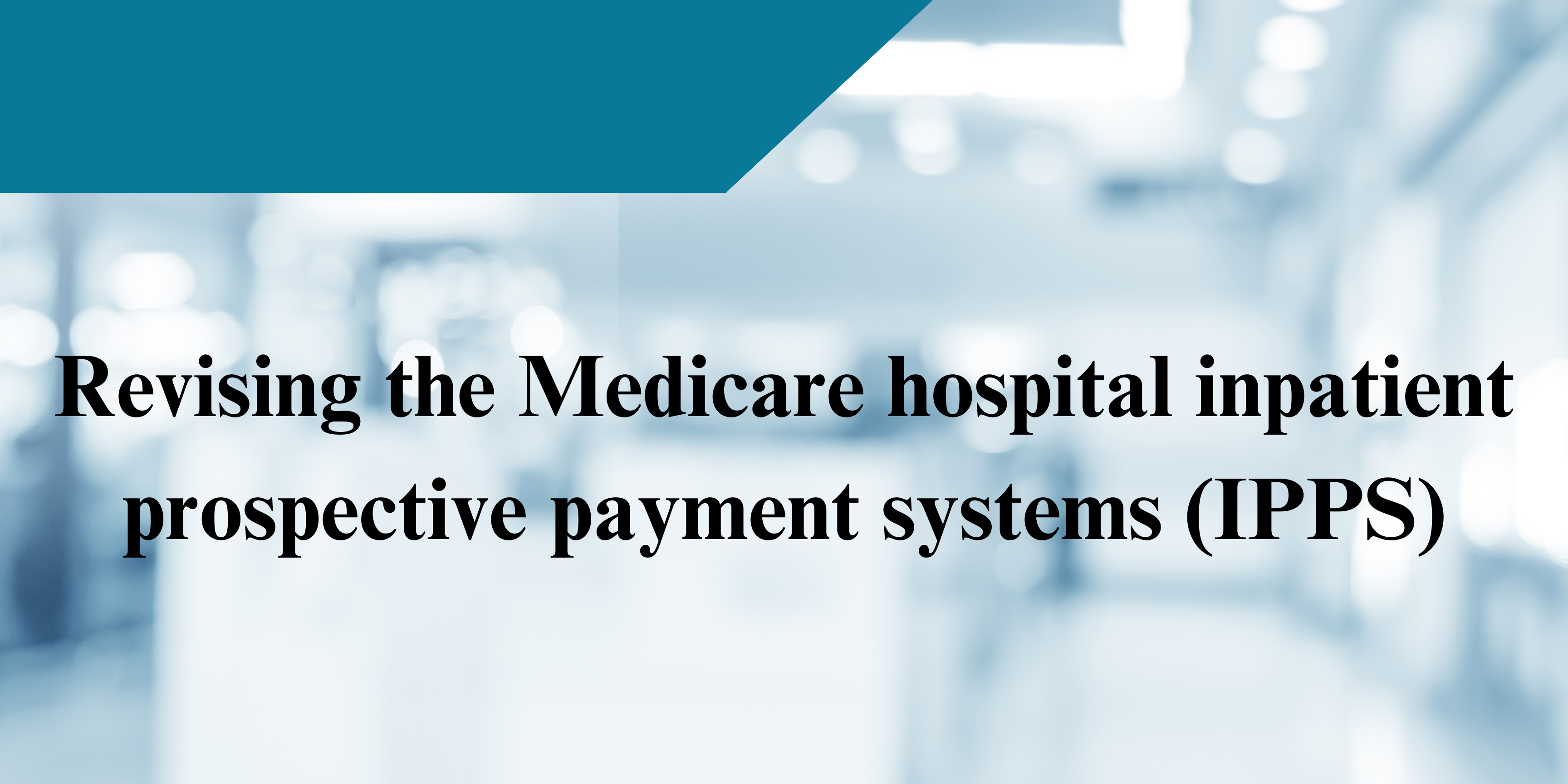
Revising The Medicare Hospital Inpatient Prospective Payment Systems (IPPS)
On April 10, the Centers for Medicare & Medicaid Services (CMS) issued the proposed rule (CMS-1808-P) for the Inpatient Prospective Payment System (IPPS) for Fiscal Year 2025. This proposed rule includes updates to payment policies and rates for acute care inpatient hospital services under Medicare.
A significant focus of this year's rule is addressing drug shortages. CMS proposes providing separate payments to small, independent hospitals to help them establish and maintain a buffer stock of essential medications. The rule also emphasizes health equity by proposing to collect data on homelessness and allocating additional funding for graduate medical education (GME) slots. These measures aim to encourage new physicians to practice in rural and underserved areas. To assist stakeholders in understanding the proposed changes, CMS has prepared a fact sheet summarizing the significant policies included in the rule.
Proposed Rule for IPPS Hospitals and Healthcare Systems
The proposed rule has highlighted the below-mentioned things for the hospitals and healthcare systems:
IPPS Payment Rates
The Centers for Medicare & Medicaid Services (CMS) has proposed a 2.6 percent increase in payment rates for general acute care hospitals that participate in the Hospital Inpatient Quality Reporting program and use meaningful electronic health records. This proposed increase would result in an estimated $2.9 billion rise in hospital payments for FY 2025. The adjustment is based on a projected market basket increase of 3.0 percent, offset by a 0.4 percentage point productivity reduction. Hospital groups, citing rising healthcare delivery costs, have expressed concerns that the 2.6 percent increase is insufficient.
CMS also plans to revise the factors for calculating uncompensated care payments, projecting an additional $560 million for Medicare uncompensated care at disproportionate share hospitals (DSH) in FY 2025. Payments for inpatient cases involving new medical technologies are expected to rise by $94 million, thanks to the continuation of new add-on payments for various technologies. Without new legislation, additional payments for Medicare Dependent Hospitals and temporary adjustments for low-volume hospitals will expire on December 31, 2024.
Low-Hospital Wage Index Policy
CMS plans to extend its temporary low-hospital wage index policy, along with the associated budget neutrality adjustment, for at least three more years, covering FY 2025 through FY 2027. This policy, initially implemented during the COVID-19 public health emergency, raised the wage index for hospitals with values below the 25th percentile. CMS intends to delay a comprehensive review of this policy until enough time has elapsed since the end of the PHE to adequately evaluate its impacts before making any changes or discontinuing it.
Separate Payment for Graduate Medical Education
CMS is set to allocate 200 new GME residency slots for FY 2026, as mandated by the Consolidated Appropriations Act of 2023. At least half of these slots are designated for psychiatry or psychiatry subspecialty programs, with no hospital receiving more than ten positions. To qualify, hospitals must demonstrate a strong likelihood of filling these positions within the first five training years.
Additionally, the distribution requires that at least 10 percent of the slots go to each of the following categories: rural hospitals, hospitals over the GME cap, hospitals in states with new medical schools, and hospitals in Health Professional Shortage Areas (HPSAs). CMS proposes awarding up to 1.00 FTE to all qualifying hospitals that apply on time, with any remaining slots prioritized based on HPSA scores. Notifications of the first awards are expected by January 31, 2026.
CoP for Acute Respiratory Illness and Reporting on Quality of Inpatient Hospital Care
CMS has proposed a rule to permanently modify the Conditions of Participation (CoP) for hospitals. The rule would require weekly reporting on acute respiratory illnesses, including COVID-19, influenza, RSV, hospital capacity, and patient demographics, through a CDC-supported system extending beyond public health emergencies.
Additionally, CMS seeks feedback on mandating the collection of race and ethnicity data related to this CoP. At the same time, CMS invites public comments to enhance reporting programs that measure the quality of inpatient hospital care, aiming to adopt new measures that better reflect patient outcomes and propose changes to the Hospital Inpatient Quality Reporting (IQR) Program. CMS is also considering updates to the Hospital Consumer Assessment of Healthcare Providers and Systems (HCAHPS) Survey measure. These proposed changes are part of CMS's broader effort to improve healthcare quality and data accuracy.
Final Verdict
The proposed updates to the Medicare Hospital Inpatient Prospective Payment Systems (IPPS) for FY 2025 reflect CMS's commitment to enhancing healthcare delivery and addressing critical issues such as drug shortages and health equity. Key proposals include a 2.6 percent increase in payment rates, support for maintaining essential medication stocks, and allocation of new GME residency slots to underserved areas. The extension of the low-hospital wage index policy and permanent changes to reporting on acute respiratory illnesses further illustrate CMS's efforts to ensure comprehensive and equitable healthcare. Stakeholders are encouraged to review and provide feedback on these significant policy adjustments.




